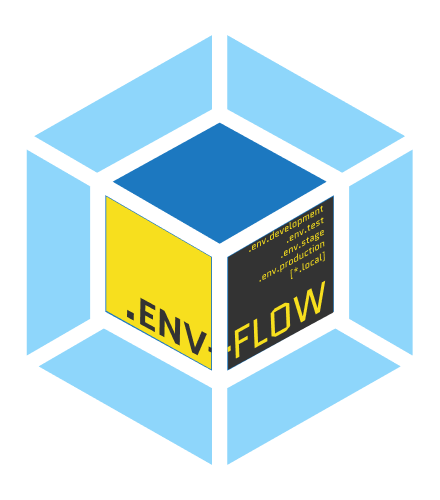A secure webpack plugin that gives the ability to access environment variables via process.env.* defined in your .env, .env.development, .env.test, .env.production, etc,. files within your web applications built with webpack.
Storing configuration in environment variables separate from code and grouping them by environments like development, test and production is based on The Twelve-Factor App methodology.
backed by dotenv-flow, inspired by dotenv-webpack
Using NPM:
$ npm install dotenv-flow-webpack --save-devUsing Yarn:
$ yarn add dotenv-flow-webpack --devTechnically, the plugin wraps the dotenv-flow API providing the ability to configure it in your webpack.config.js file(s).
Note that plugin uses a secure strategy of replacing of the process.env.* code entries upon the build process, thus it exposes only environment variables that are used in your code.
Let's suppose you have the following files in your project:
# .env
DATABASE_HOST=127.0.0.1
DATABASE_PORT=27017
DATABASE_USER=default
DATABASE_PASS=
DATABASE_NAME=my_app
SERVICE_URL=/api/v1# .env.development
DATABASE_NAME=my_app_dev
SERVICE_URL=http://localhost:3000/api/v1# .env.test
SERVICE_URL=https://localhost:3001/api/v1# .env.production
DATABASE_HOST=10.0.0.32
DATABASE_PORT=27017
DATABASE_USER=devops
DATABASE_PASS=1qa2ws3ed4rf5tg6yh
DATABASE_NAME=application_storage
SERVICE_URL=https://myapp.com/api/v1// webpack.config.js
const DotenvFlow = require('dotenv-flow-webpack');
module.exports = {
// ...
plugins: [
new DotenvFlow()
],
// ...
};// file1.js
if (process.env.NODE_ENV !== 'production') {
console.log(`Running in the "${process.env.NODE_ENV}" mode.`);
}
else {
console.log('We are in production!');
}
const USERS_ENDPOINT = process.env.SERVICE_URL + '/users';
console.log('USERS_ENDPOINT:', USERS_ENDPOINT);Thus, when you build your app with NODE_ENV=development, the resulting bundle will include something like this:
// file1.js
if (true) {
console.log("Running in the ".concat("development", " mode."));
} else {}
const USERS_ENDPOINT = "http://localhost:3000/api/v1" + '/users';
console.log('USERS_ENDPOINT:', USERS_ENDPOINT);Or if you build your app with NODE_ENV=production, then the output will look like:
// file1.js
if (false) {} else {
console.log('We are in production!');
}
const USERS_ENDPOINT = "https://myapp.com/api/v1" + '/users';
console.log('USERS_ENDPOINT:', USERS_ENDPOINT);And after all the optimization procedures it will be compressed till:
console.log("We are in production!");
console.log("USERS_ENDPOINT:", "https://myapp.com/api/v1/users");Make a note that values of DATABASE_(HOST/PORT/USER/PASSWORD/NAME) will not be present in the resulting bundle while they are not referenced anywhere in the code.
As a wrapper of dotenv-flow, dotenv-flow-webpack has the same configuration options extending them with its own described below.
By default, the plugin refers the NODE_ENV environment variable to detect the environment to use.
With the node_env option you can force the module to use your custom environment value independent of process.env.NODE_ENV.
module.exports = (env, argv) => {
// ...
config.plugins.push(new DotenvFlow({
node_env: env.production ? 'production' : 'development'
}));
// ...
};If the NODE_ENV environment variable is not set, the module doesn't load/parse any NODE_ENV-specific files at all.
Therefore, you may want to use "development" as the default environment.
new DotenvFlow({
default_node_env: 'development'
})With the path initialization option you can specify a path to .env* files directory.
new DotenvFlow({
path: '/path/to/env-files-dir'
})If the option is not provided, the current working directory will be used.
You can specify the encoding of your files containing environment variables.
new DotenvFlow({
encoding: 'base64'
})If true, all the predefined process.env.* variables will also be loaded.
In accordance to the dotenv-flow's specification, all the predefined system environment variables will have higher priority over the .env* files defined.
new DotenvFlow({
system_vars: true
})Set to true to suppress all errors and warnings.
Please refer the dotenv-flow documentation to learn more about the .env* files concept.
Here is the list of related sections:
Feel free to dive in! Open an issue or submit PRs.
Using NPM:
$ npm testUsing Yarn:
$ yarn testLicensed under MIT © 2019-2020 Dan Kerimdzhanov
